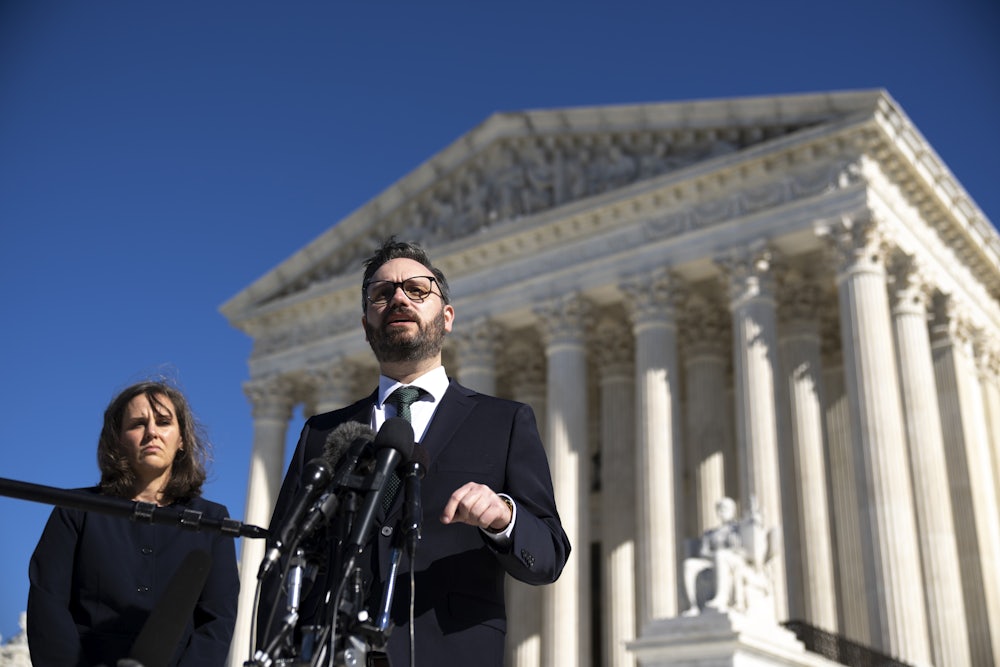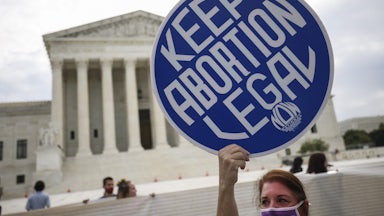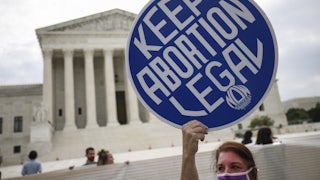A majority of justices on the Supreme Court appeared ready to side with abortion providers in their case against Senate Bill 8, the controversial Texas law that uses bounty-like lawsuits effectively to ban abortions in the state, during oral arguments on Monday. At first glance, this may sound like odd news to hear—it was, after all, the court’s conservative majority that initially allowed the law to stand, in a shadow-docket ruling in September, and which is widely expected to undo Roe’s protections when it hears another abortion rights case in December. Perhaps the conservative justices simply prefer the cleaner shot this latter case offers them; as far as S.B. 8 is concerned, they seemed all but ready to reject a state law that was specifically designed to undermine the court’s power.
“Nobody is going to risk violating the statute, because they’ll be subject to suit for a million dollars,” Roberts said when questioning Texas Solicitor General Judd Stone II about a hypothetical version of an S.B. 8-like law. “That takes a lot of fortitude, to undertake the prohibited conduct in that case. And under the system, it is only by undertaking the prohibited conduct that you can get into federal court.”
The two S.B. 8 cases heard on Monday are simultaneously about abortion and not about abortion at all. Both cases revolve around complex procedural questions about whether the federal courts—and the Supreme Court, by extension—can hear the case at the earliest stage of the dispute. In Whole Woman’s Health v. Jackson, a group of abortion providers sued various state and local officials in Texas to challenge S.B. 8’s constitutionality. In United States v. Texas, the Justice Department sued the state of Texas to argue, among other things, that S.B. 8 violates the Constitution’s Supremacy Clause and undermines the federal courts’ authority.
The best way to understand S.B. 8 is not as a regular state law but an ideological act of defiance. Until this year, anti-abortion litigants who sought to ban the procedure in their states faced a major hurdle to success: Whenever a state legislature passed a law that restricted abortion, clinics and other abortion providers would haul the state into federal court under Section 1983, a major Reconstruction-era law that allows people to sue state and local officials in federal court for violating their rights. The federal courts, citing Roe v. Wade and Planned Parenthood v. Casey, would then invariably issue an injunction to block state and local officials from enforcing the state law in question.
Jonathan Mitchell, a former Texas solicitor general, sought a way around Section 1983 in particular and the federal courts in general. He proposed enacting a law that does not explicitly ban abortion but instead allows anyone—Texas residents, people in other states, perhaps even Martians—to sue anyone who performs an abortion or “aids and abets” the procedure in Texas if performed after six weeks. To evade Section 1983 directly, S.B. 8 forbids state and local officials who could be sued under the federal law from filing any lawsuits under the state law. And to make standing more difficult to obtain in federal courts, S.B. 8 forbids anyone from filing a lawsuit against a woman who seeks or obtains an abortion.
Oral arguments delved into some technical and procedural aspects of S.B. 8, like how the law interacts with the court’s 1908 precedent in Ex Parte Young or how the Texas Supreme Court’s approach to standing overlaps with the approach in the federal courts. But the real question before the justices was essentially whether Texas could negate the Supreme Court’s rulings and get away with it. Focusing on the technical aspects almost gives the Texas legislature too much credit. S.B. 8 is philosophically indistinguishable from an older sibling who holds their fist in front of your face and chants, “I’m not touching you! I’m not touching you!” Justice Elena Kagan derisively referred to the law’s authors—perhaps including Mitchell, who was in the courtroom on Monday to argue on behalf of a group of private defendants in U.S. v. Texas—as “some geniuses” who had labored to find a “chink in the armor” of Young and exploited it when they did.
When abortion providers filed a federal lawsuit anyway, the deeply conservative Fifth Circuit Court of Appeals rewarded Texas’s legal trickery and declined to block the law from going into effect in August. Five of the Supreme Court’s six conservative justices then accepted the fait accompli in September, declining to intervene in the dispute when it reached the court’s shadow docket. Two weeks ago, the justices rejected another request to suspend S.B. 8 but agreed to hear the two lawsuits in question on a highly accelerated schedule, giving the parties just 10 days to file briefs and prepare for oral arguments. The last time the Supreme Court moved that quickly was almost 21 years ago next month, in Bush v. Gore.
There are three somewhat overlapping problems that S.B. 8’s opponents have identified with the law. One is that it effectively amounts to a ban on abortions performed after six weeks, which can be before many women know they are pregnant. (The law’s anti-abortion supporters naturally consider this to be a feature, not a bug.) Another is that it transforms Texas state courts from places of law and equity into lopsided forums for bounty hunting. Those who bring S.B. 8 lawsuits can collect at least $10,000 and other damages from the defendant if they win, despite not having suffered any real injury, while the defendants can’t even collect lawyers’ fees if they prevail. That fundamental lack of fairness may be why S.B. 8 is deeply unpopular among the American public.
The third and final problem with S.B. 8 is perhaps its greatest one: It effectively negates the Supreme Court’s decisions within Texas’s borders and creates a blueprint to undermine the high court and the Constitution in other states. “Texas designed S.B. 8 to thwart the supremacy of federal law in open defiance of our constitutional structure,” Solicitor General Elizabeth Prelogar, who represented the federal government at oral arguments on Monday, told the justices. “States are free to ask this court to reconsider its constitutional precedents, but they are not free to place themselves above this court, nullify the court’s decisions in their borders, and block the judicial review necessary to vindicate federal rights.”
Those concerns appeared to resonate among at least three of the court’s conservative justices. Chief Justice John Roberts, who dissented from the court’s decision to allow S.B. 8 to go into effect in September, asked whether a law allowing a $1 million bounty instead of a $10,000 bounty would create enough of a chilling effect for the federal courts to intervene. Stone said no. He also questioned the Texas solicitor general on whether he agreed with a brief filed by Mitchell in proceedings in the lower courts, where Mitchell had argued that “states have every prerogative to adopt interpretations of the Constitution that differ from the Supreme Court’s.” Stone distanced himself from Mitchell’s view and said Texas would faithfully follow the court’s decisions.
Defenders of S.B. 8 have argued that any defendant could still make constitutional arguments about Roe and Casey in Texas state court and try to seek relief there. Justice Amy Coney Barrett noted that part of S.B. 8 appears to limit the degree to which defendants could make those constitutional arguments before Texas state judges. “If that’s the case, the full constitutional defense cannot be asserted in the defensive posture,” Barrett said. “Am I right?” Marc Hearron, who argued on behalf of the clinics, said that she was.
One of S.B. 8’s most notable critics was the Firearms Policy Center, a gun rights group with no particular interest in abortion rights. It filed a friend-of-the-court brief to oppose S.B. 8 because similar laws could be applied against the Second Amendment. “Texas’s novel scheme for infringing upon and chilling the exercise of the right to abortion under this court’s Roe and Casey decisions, if allowed to stand, could and would just as easily be applied to other constitutional rights,” the group told the justices last month. “That result is wholly anathema to our constitutional scheme, regardless [of] what one thinks of abortion or, indeed, of any other hotly debated constitutional right, such as the right to keep and bear arms.”
Justice Brett Kavanaugh pressed Stone on whether he accepted the group’s reasoning. “It could be free speech rights,” he told Stone. “It could be free-exercise-of-religion rights. It could be Second Amendment rights, if this position is accepted here. The theory of the amicus brief is that it can be easily replicated in other states that disfavor other constitutional rights.” Stone replied that Congress could intervene with legislation if other states tried to pass those laws. “For some of those examples, I think it would be quite difficult to get legislation through Congress,” Kavanaugh replied, pressing the solicitor general further on whether the federal courts could intervene against those laws. Stone eventually conceded that they couldn’t under the state’s argument.
It’s easy to imagine other possibilities for state laws where the scope of rights are contested. Gun rights advocates fear that states like California or New York could pass laws that, say, allow anyone to sue someone who owns an AR-15 and collect $10,000, if the Supreme Court upholds S.B. 8. State legislatures that oppose marriage equality could allow bounty lawsuits against officiants of same-sex weddings or third-party vendors that cater them; state legislatures that favor marriage equality could pass similar laws to target conservative Christian vendors who refuse to work with same-sex couples.
Ironically, S.B. 8’s acts of legalistic legerdemain could soon be rendered pointless. In exactly one month, the Supreme Court will hear arguments in Dobbs v. Jackson Women’s Health Organization, another abortion-related case. The state of Mississippi is directly asking the court to reconsider and overturn Roe and Casey in that case, and given the current roster of justices, there is an exceedingly strong likelihood that it’ll succeed. By next summer, Texas may be able to enact an actual six-week abortion ban without using the bag of procedural tricks it pulled out for S.B. 8.
But the Texas state legislature chose not to wait, and now the court seems poised to hand it a defeat and reassert its own authority. Again, it’s always a fraught game to predict how the Supreme Court will rule on a case based on how the justices ask questions at oral arguments. But perhaps the most telling portion came at the very end, when Mitchell, one of Kagan’s pejorative “geniuses” behind S.B. 8, rose to make his case. Only three of the justices asked him any questions—maybe because they had exhausted their lines of inquiry after roughly three hours of oral arguments, or maybe because they didn’t really need to hear his answers.










